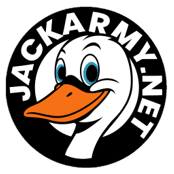It’s time to turn the lens once more. With the Swans heading to The Valley this weekend, our latest In Focus piece lands on Charlton Athletic, a club with a curious past, a familiar face in the dugout, and a fanbase that’s seen it all. From Premier League stability to exile from their own ground, from being a model for Swansea’s early 2000s boardroom dreams to now scrapping for Championship survival, Charlton’s story is anything but dull.
This isn’t just another away day. It’s a meeting of two clubs who’ve both known the highs of top-flight football and the lows of financial uncertainty. While Swansea arrive off the back of a bruising midweek cup exit to Manchester City and a much-needed league win over Norwich, Charlton are quietly building momentum. Nathan Jones, yes, that Nathan Jones, is overseeing a side unbeaten in three, sitting sixth in the table, and unbeaten at home since early October.
So what should we expect? A trip to a ground steeped in history, a manager who divides opinion in these parts, and a fanbase that’s realistic but quietly hopeful. Over the next few sections, we’ll dig into Charlton’s past, their present, and what this fixture means for both clubs. Buckle in.
🏟️ Who Are Charlton Athletic?
Charlton Athletic Football Club was founded on 9 June 1905 in south-east London. Known as The Addicks, the club turned professional in 1920 and joined the Football League Third Division South in 1921, quickly establishing itself as a competitive force. Their early years were marked by rapid progress, winning the division in 1928–29 and again in 1934–35, which led to promotion to the Second Division.
The club’s golden era arrived in the 1930s and 1940s, with Charlton finishing second in the First Division in 1936–37, their highest-ever league position. They reached the FA Cup final in 1946, losing to Derby County, but returned the following year to lift the trophy with a 1–0 win over Burnley. This period was overseen by legendary manager Jimmy Seed, who led the club for 23 years until his departure in 1956.
Following Seed’s exit, Charlton experienced a turbulent few decades, bouncing between divisions and facing financial instability. They were relegated from the top flight in 1957, dropped to the Third Division in 1972, and faced administration in the 1980s. Despite these setbacks, the club showed resilience, securing promotion back to the First Division in 1985–86 and later becoming a Premier League side under Alan Curbishley.
Charlton’s identity has long been tied to its community roots, its South London rivalries with Millwall and Crystal Palace, and its passionate fanbase. Today, the club competes in the Championship, having earned promotion via the 2025 League One play-offs, and continues to fight for stability and relevance in a fiercely competitive league.
🧠 Their Manager — Nathan Jones
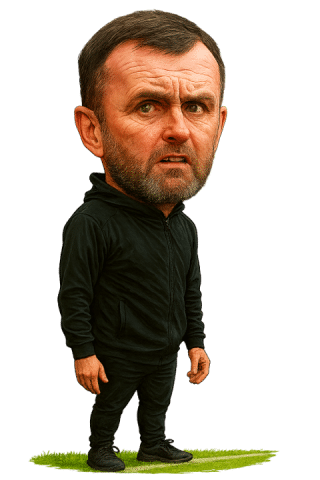 Nathan Jones took charge of Charlton Athletic in February 2024, returning to a club where he once coached the under-21s. His appointment followed a chaotic spell at Southampton, where his brief tenure became a punchline more than a legacy. At Charlton, though, he’s steadied the ship, guiding them to promotion via the 2025 League One play-offs and into a solid start in the Championship.
Nathan Jones took charge of Charlton Athletic in February 2024, returning to a club where he once coached the under-21s. His appointment followed a chaotic spell at Southampton, where his brief tenure became a punchline more than a legacy. At Charlton, though, he’s steadied the ship, guiding them to promotion via the 2025 League One play-offs and into a solid start in the Championship.
Jones is best known for his success at Luton Town, where he built a side that punched well above its weight. His first stint there earned him the 2021–22 Championship Manager of the Season award, and his tactical intensity and data-driven approach won admirers, just not in Swansea.
Here, he’s neither respected nor adored. If anything, he’s best ignored. His name was once floated so often during Paul Watson’s tenure that it became a running gag, with fans joking he was being appointed daily. Being Welsh earns him no favour, and while he’s come a long way since being the subject of a Bananarama parody, he’ll still get his share of banter from the away end.
Charlton fans see a manager rebuilding his reputation. Swans fans see a familiar face they’re happy to keep at arm’s length.
🏟️ The Valley
For Charlton Athletic fans, The Valley is more than a stadium. It is a symbol of identity, resilience, and hard-won return. But between 1985 and 1992, it was not home at all. Financial turmoil and structural neglect forced the club into an extraordinary groundshare with Crystal Palace at Selhurst Park, a move that stunned both sets of supporters.
The East Terrace at The Valley had been condemned, legal disputes surrounded the West Stand, and the club’s ownership had splintered. With the ground deemed unfit for hosting matches, Charlton approached West Ham for a groundshare but were turned down. In a last-minute twist, they struck a deal with Palace just hours before facing them in a league fixture. The irony was sharp, the discomfort sharper. Palace and Charlton had never been close, and now Addicks fans were commuting seven miles to watch home games in enemy territory.
Despite the awkward arrangement, Charlton thrived. They won promotion to the First Division in 1986, stayed there for four seasons, and built a squad that punched above its weight. But the groundshare was never popular. Palace fans resented the intrusion, Charlton fans felt displaced, and the atmosphere was never quite right.
In 1991, the club briefly moved to Upton Park, but the real victory came in December 1992 when Charlton returned to The Valley. A 1–0 win over Portsmouth marked the occasion, with Colin Walsh scoring the only goal. It was not just a match, it was a homecoming and the end of a chapter that tested the soul of the club.
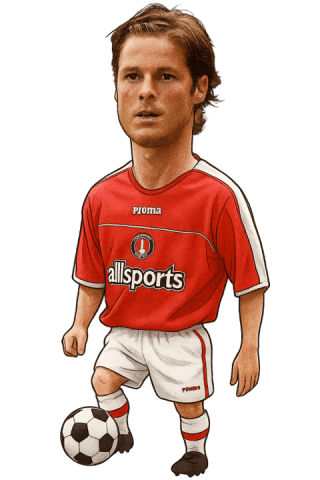
🏆 The “Glory” Years
At the turn of the millennium, Charlton Athletic were not just surviving in the Premier League, they were thriving. Under the steady hand of Alan Curbishley, the Addicks became a model of stability, punching above their weight in the top flight for eight consecutive seasons from 2000–01 to 2006–07.
Their rise began with a dramatic 1997–98 play-off final win over Sunderland, a 4–4 draw settled by penalties that remains one of the most iconic matches in English football history. After a brief relegation, they bounced back immediately in 1999–2000, winning the First Division title and returning to the Premier League with momentum.
During their top-flight run, Charlton never finished lower than 17th, peaking at 7th in 2003–04, and regularly sat mid-table while operating on a modest budget. Curbishley’s sides were disciplined, tactically sound, and built around underrated talent like Claus Jensen, Scott Parker, and Richard Rufus. Their success was built on smart recruitment, strong leadership, and a clear identity, qualities that caught the attention of Swansea’s then-emerging board.
In the early 2000s, as Swansea City were climbing out of financial ruin and rebuilding their structure, Charlton were held up as a blueprint. A club with limited resources, a loyal fanbase, and a clear plan. There was genuine talk of Swansea becoming the new Charlton Athletic, a phrase that now feels quaint, but at the time, it was aspirational.
Charlton’s Premier League spell ended in 2007, and they have never returned. But for a time, they were the club others wanted to be.
🧑⚖️ The Referee — David Webb
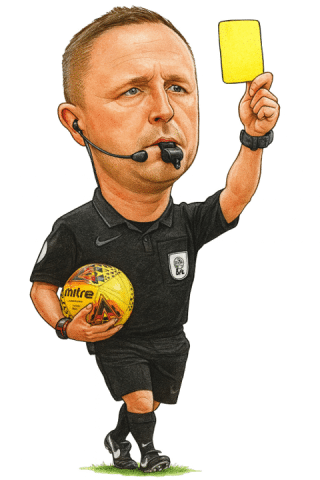 Saturday’s clash at The Valley will be overseen by David Webb, a familiar figure in EFL circles. Webb has been a regular in the Championship for over a decade and brings a no-nonsense style to his officiating. He will be assisted by Callum Gough and Lee Venamore, with George Laflin as fourth official.
Saturday’s clash at The Valley will be overseen by David Webb, a familiar figure in EFL circles. Webb has been a regular in the Championship for over a decade and brings a no-nonsense style to his officiating. He will be assisted by Callum Gough and Lee Venamore, with George Laflin as fourth official.
Swans fans have seen plenty of Webb over the years, and the record is far from sparkling. According to SCFC2, Webb has officiated 15 Swansea matches since
2014, with the Swans winning just 4, drawing 5, and losing 6. His most recent outing involving Swansea was the 2–1 defeat to West Brom in August 2023, a match remembered more for defensive lapses than refereeing controversy.
Webb tends to let games flow, averaging 3.6 yellow cards per match this season, and has issued just one red card in his last 10 Championship fixtures. He is not known for dramatic decisions, but Swans fans will be wary. His track record includes a few contentious penalty calls, including one against Swansea in a 2021 clash with Reading.
Charlton, meanwhile, have had Webb in charge twice this season, both ending in draws. He is not seen as a lucky charm for either side, but his steady hand could suit a fixture that promises intensity without chaos.
🗣️ Valley Voices
Darren has been following Charlton Athletic since 1961. He’s seen promotions, relegations, exile from The Valley, and the Premier League years under Curbishley. Now in his seventies, he still makes the walk to SE7 for every home game, rain or shine.
“I’m happy we’re back in the Championship,” he says. “That’s where we belong right now. I’m not dreaming of promotion, I just want us to stay here and build something that lasts.”
us to stay here and build something that lasts.”
Darren’s realism is refreshing. He’s not chasing grand visions or top-six fantasies. He knows the league is brutal and the margins are thin. “We’ve got a manager who’s trying to do things properly. I wasn’t sure about Jones at first, but he’s got us organised. That’s a start.”
Ahead of the Swansea match, Darren is quietly confident. “I’m always quietly confident before a home game,” he laughs. “Doesn’t always mean much, mind. I’ve said that before and gone home miserable.”
He remembers the days when Charlton were the club others wanted to be. “We had a good run. Proper players, proper leadership. It felt like we were doing things the right way. Now it’s about surviving, and maybe one day thriving again.”
There’s no bluster, no bravado. Just a fan who’s seen it all and still turns up. That’s Charlton. That’s The Valley.
🔮 The Prediction
Charlton are unbeaten in three and haven’t lost at home since early October. Swansea arrive with a mixed bag: a cup exit to Manchester City, a gritty win over Norwich, and a squad still searching for fluency. The Valley will be loud, the pitch tight, and the margins thin.
Charlton will press early, especially down the flanks, where their wing-backs have caused problems for better sides. Swansea will need composure in midfield and sharper transitions than they’ve shown in recent weeks. Expect a cagey first half, a few flashpoints, and a result that neither side will love nor hate.
This won’t be a classic, but it could be a scrap worth watching. One goal either way feels likely. A draw wouldn’t surprise anyone.
Prediction: Charlton 1–1 Swansea
🧾 The Verdict
Charlton Athletic are no longer the club Swansea once aspired to be. Their Premier League days are gone, their blueprint faded, and their recent years have been defined more by survival than ambition. But they remain a club with history, with heart, and with a fanbase that still turns up.
Swansea arrive with their own questions. A squad in transition, a manager still shaping his identity, and a fanbase that’s seen enough false dawns to be cautious. This fixture won’t define either season, but it might reveal something about where both clubs are headed.
Expect tension. Expect noise. Expect a game that matters more than the table suggests.
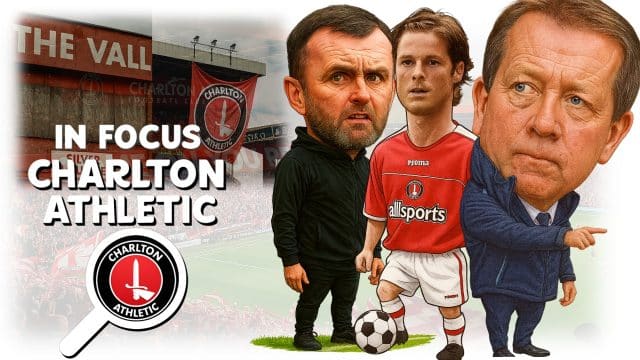
This article first appeared on JACKARMY.net.
